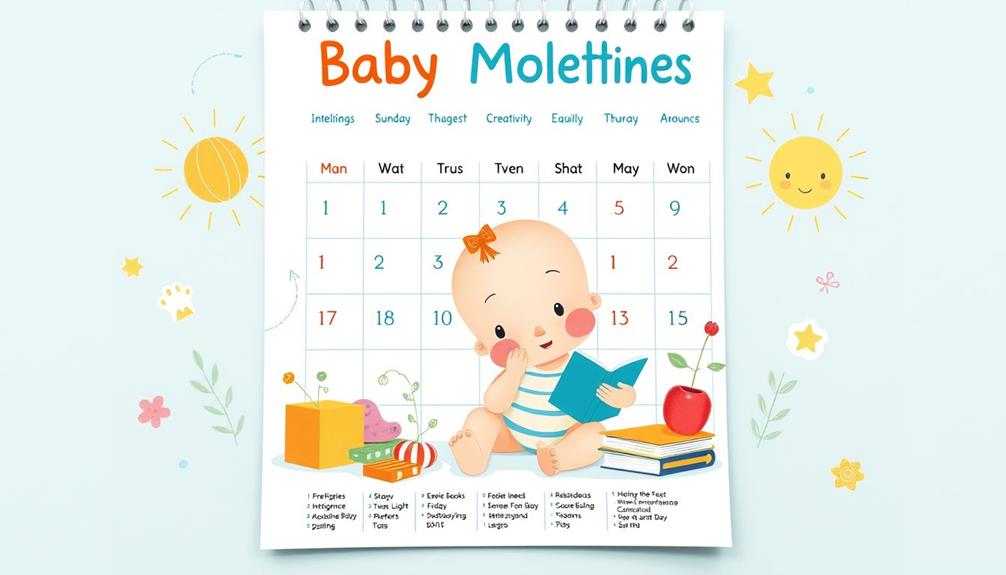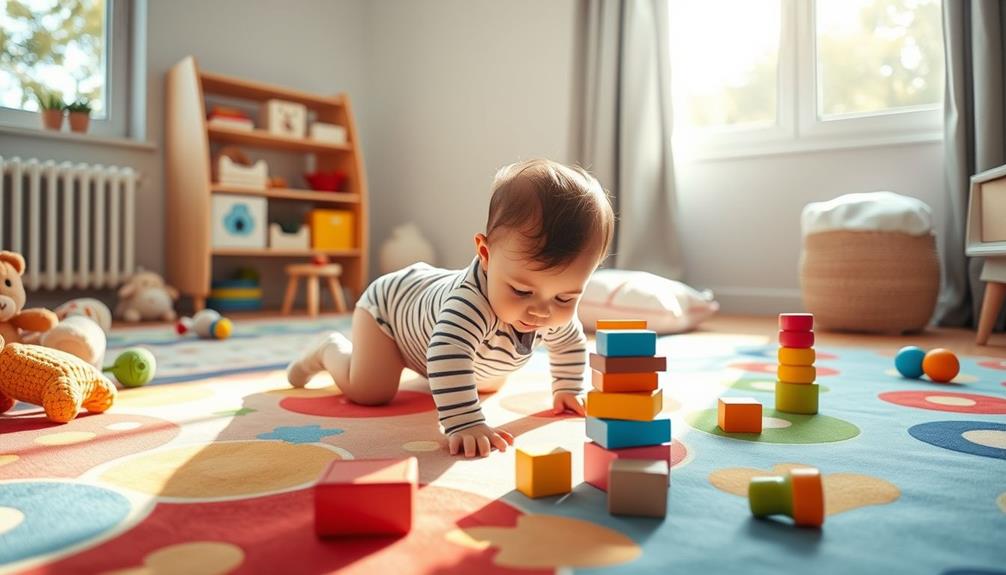Your baby might show signs of giftedness through remarkable behaviors and milestones as they grow. From birth, you'll notice exceptional alertness and curiosity in their interactions. By six months, they may respond to their name and engage in structured play. Around one year, advanced verbal skills could emerge, including simple sentences. As they reach 20 months, you might see them grasping concepts of time and numbers. By 22 months, watch for counting skills and a keenness to ask questions. If you're curious about specific signs for each month, there's much more to discover as you continue exploring.
Key Takeaways
- Gifted infants often show exceptional alertness and curiosity from birth, engaging deeply with their environment.
- Advanced motor skills, such as rolling over and walking, are typically achieved earlier than average milestones.
- Language development includes forming simple sentences and an extensive vocabulary by 18 months, indicating strong verbal skills.
- Heightened sensory awareness leads to intense exploration and attention to detail compared to peers.
- Social and emotional awareness is notable, with advanced empathy and a preference for older companions.
Early Signs of Giftedness
When it comes to identifying giftedness in babies, several key signs can help you recognize their unique abilities. Gifted children often display exceptional alertness from birth, absorbing details and engaging more with visual and auditory stimuli than their peers. You might notice them fixating on faces or sounds longer than other babies, showcasing their keen awareness.
Additionally, many gifted infants exhibit a remarkable curiosity about their environment, often exploring and interacting with objects in ways that reflect advanced problem-solving skills, similar to how tough dog names can reflect a dog's personality.
Gifted infants tend to have advanced motor skills, reaching physical milestones like rolling over, crawling, and walking earlier than average. By the time they're 18 months old, many gifted children start forming simple sentences and exhibit larger vocabularies, indicating accelerated language development.
Another sign to watch for is remarkable memory abilities; gifted babies often recognize familiar faces and places quickly, recalling and repeating activities they've observed.
Heightened social and emotional development is also common. Gifted children frequently demonstrate advanced empathy, showing an understanding of social cues and forming strong bonds with older companions.
If you notice these traits in your baby, it could be an exciting indicator of their giftedness. Recognizing these early signs can help you nurture their unique talents as they grow.
Milestones From Birth to 12 Months

As you monitor your baby's growth in the first year, pay close attention to their advanced motor skills and early verbal development.
Engaging in structured play can further stimulate their cognitive growth and problem-solving skills, enhancing their development.
You might notice them rolling over or crawling ahead of their peers, and they could start vocalizing distinct sounds or even responding to their name by 9 months.
These milestones can be exciting indicators of their gifted potential.
Early Verbal Development
Early verbal development in infants can be a fascinating journey, revealing signs of advanced cognitive abilities. From birth, you might notice your baby displaying social smiles, indicating an early connection with you and the world around them.
By six months, if your little one responds to their name and simple commands, it's a clear sign of developing communication skills.
As your baby approaches the end of their first year, pay attention to their babbling. Gifted infants often use sounds that resemble words, showing a readiness for verbal interaction. If they begin to mimic words, that's an encouraging indicator of their verbal potential.
By the time your baby is around 12 months old, they may be using their first words. If they're already displaying an understanding of simple commands and beginning to form words, you might be witnessing the early stages of advanced verbal development.
While most babies typically start speaking a few words around this age, gifted infants often exceed expectations, showcasing their exceptional communication skills.
Observing these milestones can help you identify if your baby is on a path towards giftedness in verbal abilities.
Advanced Motor Skills
From the moment your baby is born, you might notice their physical development unfolding at a remarkable pace. Gifted infants often demonstrate advanced motor skills, reaching physical milestones earlier than average.
By around 3 months, you may see your little one rolling over effortlessly, showcasing their exceptional coordination.
As they hit the 6-month mark, gifted babies typically hold objects using their finger and thumb, illustrating fine motor skill development that surpasses their peers.
At about 9 months, you might catch them scribbling spontaneously, a sign of early interest in creative expression and further coordination.
By 12 months, your child may show remarkable balance and coordination, engaging in more complex movements like climbing and exploring their environment.
You might notice them stacking blocks or fitting shapes into corresponding holes—advanced manipulation skills that reflect their cognitive engagement with physical tasks.
If your baby's motor skills seem ahead of their age group, it's a potential indicator of giftedness.
Keep observing these milestones, as they're not just physical achievements but also windows into your child's unique abilities.
Developmental Indicators by Age One

As your baby approaches their first birthday, you might notice remarkable signs of giftedness in their development.
Look for early language milestones, advanced motor skills, and heightened sensory awareness that stand out compared to peers.
Engaging in family activities that promote creativity can further enhance their abilities and support their unique talents.
These indicators can paint a picture of your child's unique abilities and potential.
Early Language Milestones
Language development in infants can reveal a lot about their cognitive abilities, especially in gifted children. By around 6 months, you might notice your baby responding to their name and simple commands. This ability shows advanced cognitive processing, indicating they're ahead of the curve.
At 9 months, gifted babies often start vocalizing different sounds and may flash a social smile, showcasing their early emotional and communicative development.
By the time they reach 12 months, you may be surprised to hear them using 3-word sentences, reflecting a significant leap in their language skills compared to their peers.
As they continue to grow, by 18 months, gifted children can have a vocabulary of 300-400 words. This extensive vocabulary allows them to engage in complex conversations, expressing themselves clearly and effectively.
Some may even surprise you by counting to 3 by 25 months, showing their grasp of numerical concepts earlier than average.
These early language milestones are strong indicators of your child's cognitive abilities and potential for giftedness. Keep an eye on these signs, as they can provide invaluable insight into your baby's exceptional capabilities.
Advanced Motor Skills
Advanced motor skills can be a telling sign of your baby's potential giftedness. If your little one is reaching physical milestones earlier than their peers, it might be worth noting.
By six months, you may see your baby holding objects with impressive precision, using their thumb and finger. This level of coordination is a strong indicator of advanced motor skills.
As your baby approaches nine months, watch for spontaneous scribbling, which not only showcases fine motor development but also hints at an early interest in creative expression.
By the time they hit 22 months, gifted toddlers often demonstrate remarkable physical agility. They may crawl and even walk up stairs with ease, illustrating their advanced motor skills compared to typical developmental timelines.
Moreover, you might notice them throwing and skipping, further emphasizing their gross motor capabilities.
These signs can set your baby apart, highlighting their potential. If you observe these advanced motor skills in your baby, it could mean they're on a path toward giftedness. Recognizing these early indicators can help you provide the right support to nurture their abilities.
Heightened Sensory Awareness
Noticing advanced motor skills in your baby can lead you to recognize another key trait of potential giftedness: heightened sensory awareness. Gifted infants often display exceptional alertness and sensitivity to their surroundings, picking up on subtle changes that others might miss.
By the time they reach six months, you might observe them engaging with their environment in ways that indicate strong sensory processing abilities.
Here are some signs of heightened sensory awareness in your baby:
- Exceptional alertness: They seem aware of sounds and movements before others do.
- Responsive to stimuli: They show preferences for bright colors, music, or varied sounds.
- Advanced motor control: They reach for and manipulate objects with remarkable coordination.
- Memory recall: They remember familiar faces and routines around ten months, demonstrating memory capabilities.
- Rich vocabulary: By their first birthday, they may express themselves using a broader range of words, linking sensory experiences with language.
If you notice these traits, it could indicate your baby's heightened sensory awareness, a sign of their potential giftedness.
Keep observing, as these early indicators are fascinating!
Significant Milestones at 20 Months

At 20 months, you might notice your child reaching considerable developmental milestones that could indicate giftedness. One of the key signs to look for is their understanding of time concepts, like days of the week and months of the year. Gifted toddlers often engage in conversations about their daily activities, showcasing advanced verbal skills and the ability to articulate thoughts clearly.
Additionally, research suggests that emotional support during early development can greatly impact cognitive growth, emphasizing the need for nurturing environments and mental health support for children.
Additionally, you may observe a keen interest in written language. Your child might recognize letters and even attempt to write their name, which is impressive for this age. Their vocabulary typically expands greatly, allowing them to form complex sentences and use varied expressions.
Curiosity is another hallmark of giftedness at 20 months. If your child enthusiastically asks questions and explores new concepts with excitement, it's a promising sign. This thirst for knowledge often drives them to learn about the world around them, making connections and demonstrating cognitive skills that set them apart from their peers.
Keeping an eye on these milestones can help you understand your child's unique abilities and support their development.
Key Signs at 22 Months
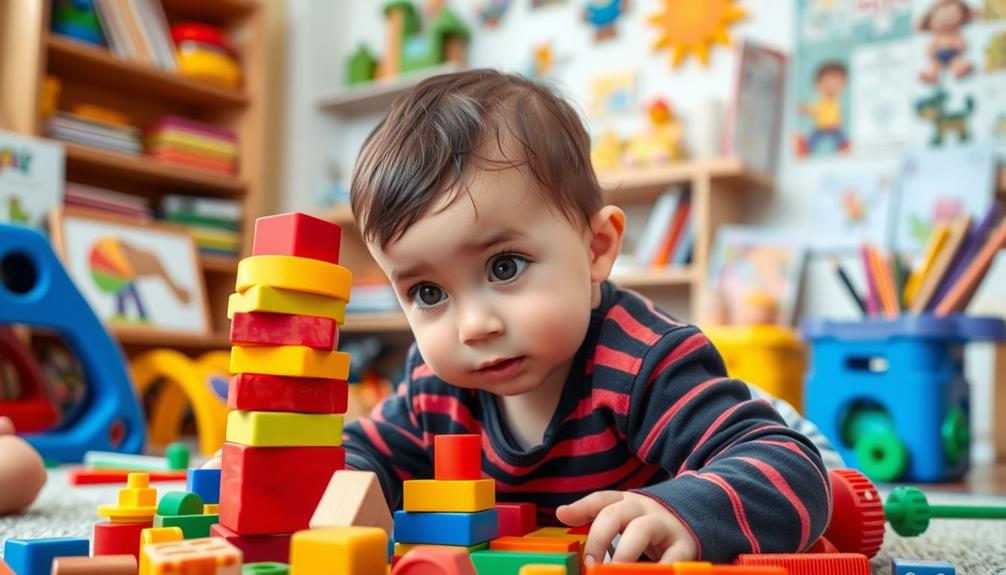
As your child approaches 22 months, you may observe even more remarkable signs of giftedness. At this age, many gifted babies begin to exhibit significant verbal improvement, using mini-sentences to clearly express their thoughts and ideas.
You might also notice their fascination with numbers and letters, which can be quite impressive. Astrological compatibility and its effects on attraction may also play a role in how children express their unique abilities early on.
Here are some key signs to look for:
- Counting Skills: Your child may count to 25 and recognize written numbers.
- Adaptability: They adapt well to loud noises, showing comfort in varying environments.
- Interest in Literacy: A strong interest in written language may emerge, indicating early reading passion.
- Social Skills: They often engage with peers and show empathy towards others.
- Curiosity: Gifted toddlers frequently ask questions about their surroundings, demonstrating a thirst for knowledge.
If you see these signs in your child, it could indicate their gifted nature.
Pay attention to their unique abilities, as they might just be on an exciting path of advanced learning and discovery.
Advanced Motor Skill Development
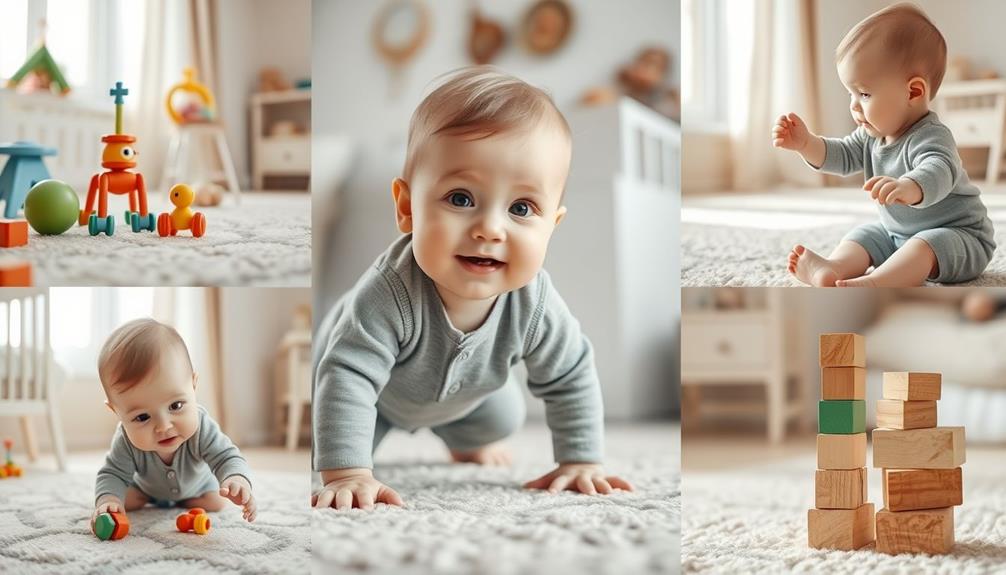
Advanced motor skill development in gifted babies often sets them apart from their peers. You might notice your little one rolling over, crawling, or even walking earlier than expected, typically between 6 to 10 months. This early achievement showcases their advanced motor skills.
Just like the precision required in perfecting espresso extraction, gifted infants display remarkable coordination and balance, allowing them to manipulate objects with impressive skill and precision by 9 months.
As your baby grows, keep an eye out for their ability to crawl and walk upstairs effortlessly by 22 months. This indicates not just strong physical development but also a natural inclination toward complex movements.
By around 9 months, gifted toddlers often begin to scribble spontaneously, and by 50.4 months, they can copy shapes like triangles, showcasing advanced fine motor skills.
You may also observe significant control over their body movements, enabling them to engage in activities like skipping and throwing by the age of 2. Such milestones are clear indicators of advanced motor skill development, suggesting that your baby might be gifted.
Recognizing these signs can help you nurture their unique abilities as they continue to grow.
Language and Cognitive Growth

Language and cognitive growth can be remarkable in gifted babies, often emerging earlier than in their peers. By six months, you might notice your baby searching for sounds with their eyes, responding to their name, and following simple commands. These behaviors suggest advanced auditory processing abilities.
Additionally, engaging in stimulating activities such as safe second trimester workouts may further enhance their cognitive development.
As your child approaches 18 months, their vocabulary could expand to 300-400 words, and they may learn new words after hearing them just once or twice. By 22 months, you might see them forming mini-sentences, counting to 25, and recognizing written numbers.
Here are some signs indicating advanced language and cognitive growth in your gifted child:
- Exhibiting longer attention spans, engaging in independent play for extended periods
- Showing interest in complex puzzles with 20 pieces or more
- Memorizing and spelling simple words
- Engaging with books and songs, retaining information well
- Demonstrating strong verbal skills and understanding commands
Social and Emotional Awareness
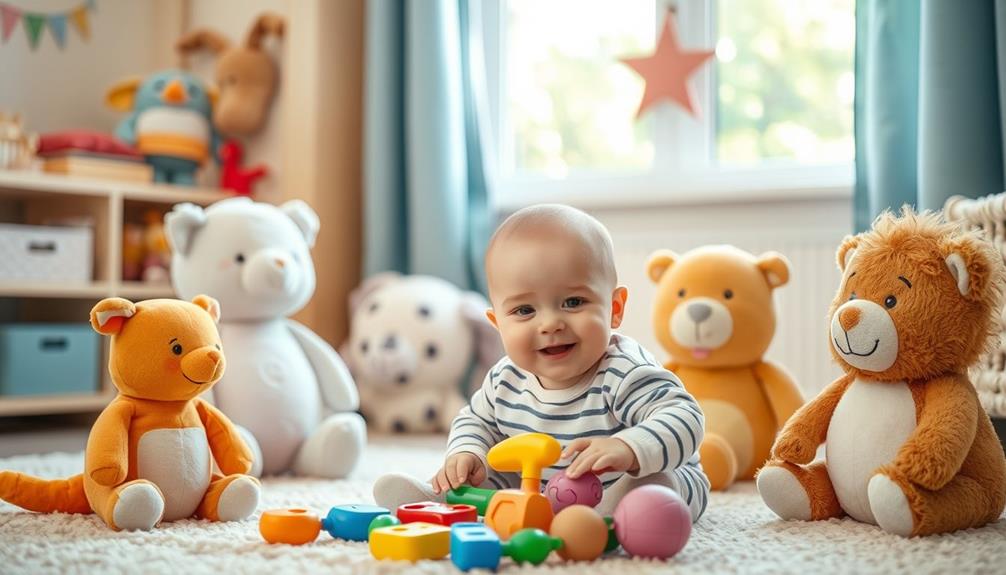
From an early age, gifted babies often show remarkable social and emotional awareness, setting them apart from their peers. You might notice that your baby demonstrates advanced social skills, displaying empathy and an understanding of social cues much earlier than other children. They may prefer interacting with older kids or adults, indicating a desire for deeper, more complex conversations. This heightened awareness can be likened to the profound insights offered by famous literary figures, who often reflect on the human experience.
You might also observe that your gifted infant exhibits intense emotional reactions to various stimuli, suggesting a heightened sensitivity to their environment. This sensitivity often translates into longer attention spans during social activities, allowing them to engage more profoundly with people and their surroundings.
Your baby might surprise you with their ability to read emotional expressions on faces, which contributes importantly to their advanced social interactions and relationships. This skill not only helps them connect with others but also enhances their understanding of social dynamics.
As you nurture this social and emotional awareness, you'll likely find that your gifted baby thrives in environments that challenge and stimulate their growing intellect and emotional depth.
Support Strategies for Parents

Supporting a gifted child involves a multi-faceted approach that can greatly enhance their development and well-being.
As a parent, you play a vital role in nurturing your child's unique abilities, which may include recognizing any potential signs of narcissistic behaviors as they develop.
Here are some effective support strategies for parents:
- Provide diverse educational resources: Offer books, puzzles, and educational toys to stimulate curiosity.
- Encourage creative expression: Engage your child in art, music, and crafts to help them explore their talents.
- Foster social interactions: Arrange playdates or group activities to help them build relationships and navigate social cues.
- Utilize play therapy: Consider therapy options to address emotional challenges like frustration or sensitivity.
- Maintain open communication with educators: Collaborate with teachers to tailor educational support and enhance their learning experience.
Frequently Asked Questions
At What Age Can You Tell if a Baby Is Gifted?
You can start noticing signs of giftedness in your baby as early as 2 months old. At this age, you might see exceptional alertness and engagement with their surroundings.
By 6 months, your baby may respond to their name and simple commands, showcasing advanced social skills.
As they approach 12 months, you might hear them using longer sentences and a larger vocabulary, indicating accelerated cognitive development and advanced verbal abilities.
How to Tell if a Baby Is Advanced?
Did you know that about 10% of babies show advanced development in key areas?
To tell if your baby is advanced, watch for signs like early crawling or walking, as well as rapid speech development. If they're forming simple sentences by 17 months or have an impressive vocabulary, that's a good indicator.
Also, notice how they engage with others; advanced babies often understand social cues and display empathy earlier than usual.
What Is the Hardest Month With a Baby?
The hardest month with a baby often seems to be around 4 months.
You might notice changes in sleep patterns, increased fussiness, and even teething discomfort. Your little one's motor skills and cognitive development ramp up, demanding more of your attention.
Plus, separation anxiety might kick in, making it tough for them to feel comforted.
It's a challenging time, but remember, you're not alone in steering through this shifting phase.
How Early Can You Identify a Gifted Child?
You might think spotting a gifted child is as easy as picking out a ripe avocado, but it's often more complex.
Surprisingly, you can identify signs of giftedness as early as two months. Look for heightened alertness and responsiveness.
By six months, advanced motor skills may show up, and by a year, they might surprise you with their vocabulary.
Conclusion
As you journey through your baby's early months, keep an eye out for those sparkling signs of giftedness. Like a budding flower, their unique traits will unfold in vibrant colors—be it through advanced language, exceptional motor skills, or keen social awareness. Embrace their individuality and nurture their potential, for you hold the watering can that helps them blossom. With love and support, you're not just raising a child; you're cultivating a brilliant mind ready to shine!

